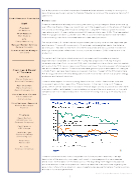Economic_2017.pdf
Credit Research Foundation Staff
President
Bill Balduino
VP of Research
Matt Skudera
CFO
Cheryl Weaverling
Manager Member Services
Barbara Clapsadle
Communications Manager
Tom Diana
Chairman & Board of Trustees
Chairman
Sharon Nickerson
Acushnet Company
Past Chairman
Marty Scaminaci
Bemis Company Inc
Vice-Chairman, Finance
Frank Sebastian
SLD of adidas
Vice-Chairman, Research
Michael Bevilacqua
PepsiCo
Trustees
Dawn Burford
InSinkErator (an Emerson Company)
Paul Catalano
ABC Amega
Jackie Mulligan
Proctor & Gamble Distributing LLC
Peter Knox
Nestle USA
Art Tuttle American Greetings
out. A Republican-controlled House and Senate will also smooth the way for more policy becoming law, particularly since the Senate libuster is no longer the legislative handcuff it used to be.
Markets react
Financial markets are already discounting the coming policy changes. Stock prices are up over 5% since Election Day to a record high, with the biggest gains in the shares of nancial institutions, and energy and industrial companies. Long-term Treasury yields have also risen sharply, with 10-year yields up almost 80 basis points to near 2.6%. This has pushed xed mortgage rates back up to well over 4%. Corporate credit spreads have narrowed, thus borrowing costs for businesses have not risen nearly as much.
The value of the U.S. dollar has also appreciated, particularly vis-à-vis the Japanese yen and the euro. The euro/$ is near parity. On a broad trade-weighted basis, the dollar is
as strong as it has been since Y2K. Oil and metals prices are also up since the election, although this may also re ect other factors, such as the recent OPEC deal to rein in its production.
Consistent with the higher stock prices and narrower credit spreads are investor expectations of corporate tax reform. Mr. Trump has proposed a 15% top marginal corporate rate, down from its current 35%, and the adoption of a territorial taxation system with a one-time 10% rate on repatriated foreign earnings. His strong support of deregulation has also cheered investors. Financial stocks have gotten a pop in anticipation of changes to Dodd-Frank, as have healthcare stocks given the likely “repeal” of the Affordable Care Act. Energy and environmental deregulation seem near certain, which is a plus for energy producers and related industries.
Investors also appear to be anticipating scal stimulus―de cit nanced tax cuts and increases in government spending. This is clearest in the rise in long-term Treasury yields, which can be traced to increases in in ation expectations, expected real short-term rates which re ect anticipated future monetary policy, and the term premium, or the yield compensation that investors require for the risk of investing in a long-term security (see Chart 1).
1
Investors understand that stimulus applied to a full-employment economy―an apt description of the economy next year―will result in more wage and price pressures
and a faster normalization of monetary policy. The big swing from negative to positive since the election in the term premium―which is sensitive to expectations regarding the government’s future scal situation―says investors also appear to believe Trump’s policies will add to future budget de cits.
2
©2017 Credit Research Foundation
